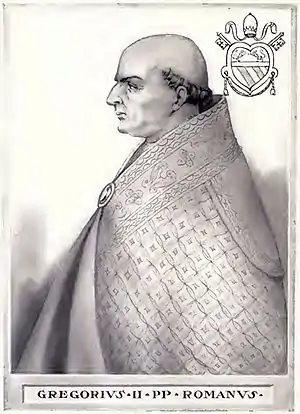715
Year 715 (DCCXV) was a common year starting on Tuesday (link will display the full calendar) of the Julian calendar. The denomination 715 for this year has been used since the early medieval period, when the Anno Domini calendar era became the prevalent method in Europe for naming years.
| Millennium: | 1st millennium |
|---|---|
| Centuries: | |
| Decades: | |
| Years: |
| 715 by topic |
|---|
| Leaders |
|
| Categories |
|
| Gregorian calendar | 715 DCCXV |
| Ab urbe condita | 1468 |
| Armenian calendar | 164 ԹՎ ՃԿԴ |
| Assyrian calendar | 5465 |
| Balinese saka calendar | 636–637 |
| Bengali calendar | 122 |
| Berber calendar | 1665 |
| Buddhist calendar | 1259 |
| Burmese calendar | 77 |
| Byzantine calendar | 6223–6224 |
| Chinese calendar | 甲寅年 (Wood Tiger) 3411 or 3351 — to — 乙卯年 (Wood Rabbit) 3412 or 3352 |
| Coptic calendar | 431–432 |
| Discordian calendar | 1881 |
| Ethiopian calendar | 707–708 |
| Hebrew calendar | 4475–4476 |
| Hindu calendars | |
| - Vikram Samvat | 771–772 |
| - Shaka Samvat | 636–637 |
| - Kali Yuga | 3815–3816 |
| Holocene calendar | 10715 |
| Iranian calendar | 93–94 |
| Islamic calendar | 96–97 |
| Japanese calendar | Wadō 8 / Reiki 1 (霊亀元年) |
| Javanese calendar | 608–609 |
| Julian calendar | 715 DCCXV |
| Korean calendar | 3048 |
| Minguo calendar | 1197 before ROC 民前1197年 |
| Nanakshahi calendar | −753 |
| Seleucid era | 1026/1027 AG |
| Thai solar calendar | 1257–1258 |
| Tibetan calendar | 阳木虎年 (male Wood-Tiger) 841 or 460 or −312 — to — 阴木兔年 (female Wood-Rabbit) 842 or 461 or −311 |

Pope Gregory II (715–731)
Events
Byzantine Empire
- May – Emperor Anastasios II is deposed in an army mutiny, and succeeded by Theodosius III, a tax-collector from the theme of Opsikion (modern Turkey). After a six-month siege, Theodosius and his troops take Constantinople; Anastasios is forced to abdicate the throne, and retires to a monastery in Thessaloniki (Macedonia).
Europe
- September 26 – Battle of Compiègne: Ragenfrid, mayor of the palace of Neustria and Burgundy (appointed by King Dagobert III), defeats Theudoald in the first battle of the Frankish civil war, following the death of Pepin II (of Herstal).
- Dagobert III dies of an illness and is succeeded by Chilperic II, son of Childeric II, as king of Neustria. Charles Martel is freed from prison at Cologne, and is proclaimed Mayor of the Palace of Austrasia at the capital Metz.
Britain
- Battle of Woden's Burg: Kings Ine of Wessex and Ceolred of Mercia clash at Woden's Burg (Wiltshire).
- King Nechtan mac Der-Ilei invites the Northumbrian clergy to establish Christianity amongst the Picts.
Arabian Empire
.jpg.webp)
Dirham of the Umayyad caliph Sulayman (r. 715–717)
- February 23 – Caliph Al-Walid I dies at Damascus after a 10-year reign, and is succeeded by his brother Sulayman ibn Abd al-Malik. During his rule the Umayyad Caliphate reaches its greatest height, with successful campaigns undertaken in Transoxiana (Central Asia), Sindh (Pakistan), Hispania and against the Byzantine Empire.
- Umayyad conquest of Hispania: Arabs led by Tariq ibn Ziyad advance from the area La Rioja (modern-day Spain), and conquer the fortress city of León.
Japan
Religion
- April 9 – Pope Constantine I dies at Rome after a 7-year reign. He is succeeded by Gregory II as the 89th pope of the Catholic Church.[1]
- Winning, an Irish monk, lands at the mouth of the River Garnock in Scotland, and establishes a community or cell of monks (termed cella or "Kil" in Gaelic).[2]
- The newly-appointed Patriarch Germanus I of Constantinople organises a council propagating Dyothelitism, and attempts to improve relations with the Armenian Apostolic Church.
- Approximate date – Tewkesbury Abbey is founded on the site of an ancient hermitage in England, by the noble brothers Oddo and Doddo.
Births
- Fujiwara no Matate, Japanese nobleman (d. 766)
- Stephen II, pope of the Catholic Church (d. 757)
- Stephen the Younger, Byzantine theologian (or 713)
Deaths
- February 23 – Al-Walid I, Muslim caliph (b. 668)
- April 9 – Constantine I, Pope of Rome (b. 664)
- July 9 – Naga, Japanese prince
- Dagobert III, king of the Franks (b. 699)
- Milburga, Anglo-Saxon abbess (approximate date)
- Muhammad ibn Qasim, Arab general (b. 695)
- Surya Devi, Indian princess
- Muhammad ibn Yusuf al-Thaqafi, Arab governor
- Qutayba ibn Muslim, Arab general (b. 669)
References
- Herbermann, Charles, ed. (1913). . Catholic Encyclopedia. New York: Robert Appleton Company.
- Dobie, p. 255
This article is issued from Wikipedia. The text is licensed under Creative Commons - Attribution - Sharealike. Additional terms may apply for the media files.